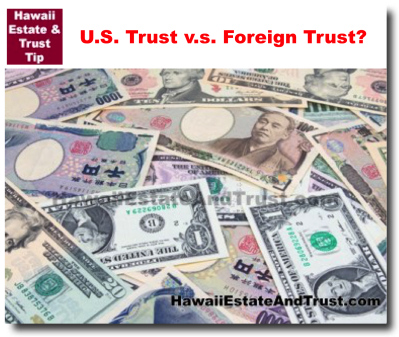U.S. Trust v.s. Foreign Trust
- Tweet

U.S. Trust v.s. Foreign Trust
Generally, most trusts prepared in the U.S. will be considered to be a U.S. Trust. However, if a trust names a non-U.S. resident or a U.S. citizen who lives outside of the U.S. as a Successor Trustee, the IRS could consider the trust to be a "foreign trust," which may lead to more tax consequences, compared to a U.S. Trust.
"Control Test" Requires a U.S. Person To Be The Trustee
The "Control Test" under the federal statutes requires that a "U.S. person" be able to control all significant decisions of the trust, in order for the trust to be classified as a U.S. Trust. Under this test, it may be a good idea to avoid appointing any person who lives outside of the U.S., and therefore, is not a resident of the U.S., or a U.S. Citizen who consistently lives outside of the U.S. Greencard-holders who reside in the U.S., or U.S. Citizens who live in the U.S. may be good candidates for a Trustee in creating a U.S. Trust.
Conclusion
When preparing a trust, it is a good idea to take note of the nationality and residential status of the person you wish to designate as a Trustee.
Article Source/Courtesy of: Yuka Hongo, Esq. (Hongo Law Office, LLLC)
This information is not intended to be a substitute for specific individualized tax, legal or estate planning advice as individual situations will vary. HawaiiEstateAndTrust.com nor its registered representatives or employees, offer tax or legal advice. As with all matters of a tax or legal nature, you should consult with your tax or legal counsel for advice.
Back to the top
|
|
ref no:34967
Please send questions about this website to webmaster
Terms of Use / Legal Disclaimer / Privacy Statement
Site Designed and Managed by MacBusiness Consulting
